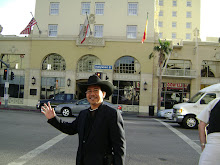That's how I sometimes feel about my work here in the seminary. We have seminarians from other congregations who come to study with us. This has been the set up since our congregation started training Filipinos on home ground. Before that, other congregations "exported" their local vocations to the west and had them trained and ordained there, and bringing them back here to help the local church. Since the SVD started Christ the King Seminary in 1933, the vision of helping the Philippine Church train its own clerics and religious on home ground guided and inspired our work.
I don't really know how admission was done before. But since I came in in 2002, there was a running observation that our students seemed to be not performing as expected academically. With the state of Philippine education in the past ten years on a downward trend, and the so-called "Generation-X" phenomenon, it should have been easier to understand the problem. However, we also realize that we cannot simply let the present problems overpower us, keeping us from doing our mission.
When the request to upgrade our screening materials was made, I immediately scouted for the most suitable assessment measures, a set that would be simple enough yet potent in identifying the performers from the sluggish. I settled for the simplest but most reliable ones: a school ability test, a general intelligence test, and an essay test which the former administrations used. I appliled the normative process to ensure the highest level of the results' validity. To make the screening process self-supporting, I charged a little higher than before so I could continually procure and use only the original sheets and booklets of the chosen measures.
Test administration, scoring and interpretation, as well as feedbacking were all happy moments for me. I have been trained in this academically and professionally. However, the feedbacking was the hardest to grapple with. Here is where I feel like I'm sailing against the tide.
There are congregations who want me to agree to accept all their chosen candidates. But some of them performed poorly in the entrance tests administered. What I did in the past three years was to caution the superiors about probable poor academic performance. I have seen at least one formator literally kneeling down before the Dean, begging to have his candidates admitted despite knowing clearly the results of his candidates. The dean threw me the ball, so to say, and being a humble believer in the Lord, I said, "Let's see." Sure enough, teachers started complaining about these said candidates' poor actual academic performance. Within the year, they all dropped like dry leaves off the tree. Would that the caution were heeded!
Year in and year out for three years, this phenomenon has kept haunting me. I had to find a way to stem this tide. Teachers feel they're wasting their time teaching such guys who just don't get it. These students may also feel like they're wasting their time sitting before teachers whose teachings they don't just get to understand, and when exam time comes, they perform poorly, and shamefacedly just give things up. The congregations may also feel like they're investing their resources for nothing. Everyone loses in the long run. We hope for the best but get the worst. And what was worse was that the recommended support mechanisms were not heeded.
I consulted a professional statistician to help me find a way to solve my problem. There's got to be a way to show that one's entry data may hint at the probable academic performance of the applicant/candidate. I collected all entrance test results of candidates who studied here and compared them with their academic performance for the past 4 semesters, and it showed a high correlation. Armed with this information, I courageously faced my fellow formators to show them the trend.
But somehow there are still those who simply don't get it the first time. Either they're of the lower types, or they're simply playing stubborn despite the fact right before their very faces. One still played an obnoxious ballgame: sending me his candidates at the eleventh hour. I really felt like my hands were being tied, and I was being forced to admit candidates who will eventually just squander all the trust and confidence given them as others their type have shown before. But this time, I had to be more courageous.
If I may hypothesize here: those who eventually continue in formation and ministry later may be those who owned their vocation and participated actively in their formation. I see these guys happily living out their calling, and joyfully witnessing their faith. Owning their vocation and active participation in their own formation seem to be functions of clear understanding about what they're into. The latter is a function of guys whose cognitive faculties function properly. The assessment results may show them. Thus, I am right now into a longitudinal study of this possibility. I understand that there may be other factors that may help along the way, but again, whatever input is afforded and gets assimilated depends upon the vessel that will eventually contain it.
Now as to the timing, I have "opened the gates" so to say so that we can already get to understand the candidates' cognitive functioning, and to make the necessary remediation early enough. And if this won't work, at least we still have more time to scout for more. This is God's work, and I believe He will send us the right persons. I hope our assessment of them is also guided by truth and charity.
Search This Blog
Friday, June 09, 2006
Subscribe to:
Post Comments (Atom)



1 comment:
dear bern gu,
ni haw?
are you testing only for admission to the CKMS philosophy department and thus, use only mental ability tests?
how about admission to the SVD in the college level? do you include a personality test?
just curious.
doming lai ming gwo :-)
Post a Comment